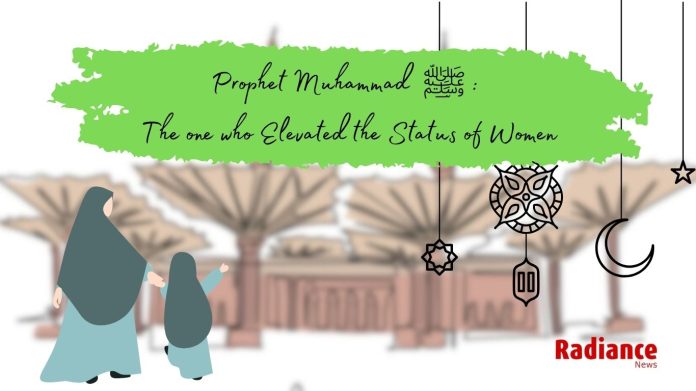—Mariya Umam Asgar Khan
Clinical Psychologist, Hyderabad

Clinical Psychologist, Hyderabad
Women have always been a subject of discussion and controversy throughout history, and the status of women in Islam is an essential topic that remains relevant today. The book “Cultural Atlas of Islam,” published by Macmillan a month after Famaqus’s death, emphasizes the significant transformation in the status of women brought about by Islam. According to the book, in the early Islamic era, women were often perceived as a threat to their parents and were unjustly interred for life. Growing up, they were regarded as mere purchased or inherited possessions. However, due to this lack of status and legal vulnerability, Islam elevated women to positions of authority and importance in the household and in society.
Islam has raised women’s status by giving them importance, roles, and responsibilities in all aspects of life, including the family, where they are responsible for nurturing their children, looking after their husband’s home, and managing financial matters. Additionally, women have been given opportunities for spiritual, social, and societal growth.
The Almighty Allah states, “I will not suffer the work of any of you, whether male or female, to go to waste; each of you is from the other” (Al-Qur’an 3:195). This verse recognizes that both men and women are individuals with distinct identities who are held accountable for their actions, rights, and moral and spiritual responsibilities.
Prophet Muhammad ﷺ emphasized the pursuit of knowledge as a duty for both men and women, recognizing that knowledge uplifts personal and societal status. Knowledge also fosters a closer connection with God, and women with righteous knowledge can nurture their children effectively and manage family and life matters. A notable example of a knowledgeable woman is Hz Aisha bint abi Bakr, one of the most learned women who quoted many sayings of Prophet Muhammad ﷺ. She played an important role in Islamic history. Another important female figure, Umm Waraqah (Nafisah), was renowned for her beautiful recitation and scholarship of the Quran. She was referred to as a woman of knowledge during the times of Prophet Muhammad ﷺ.
Throughout Islamic history, several notable Muslim women (sahabiyat) have played significant roles and made remarkable contributions. During Prophet Muhammad’s fortunate period, Hazrat Khadija bint Khuwaylid, Hazrat Aisha bint Abi Bakr, Hazrat Fatima bint Muhammad, Hazrat Umm Salama, and other contemporaries played pivotal roles. It is important for all women to be aware of these personalities and reflect on their attributes in their own lives.
Proof of women’s respect can be found in the teachings of Prophet Muhammad ﷺ, who had a great deal of respect for women. When asked which person deserved the best companionship, Prophet Muhammad ﷺ replied, “Your mother,” three times before adding, “Your father.” On another occasion, when a man expressed his desire to join a military campaign, Prophet Muhammad ﷺ inquired if he had mother. Upon confirmation, Prophet Muhammad ﷺ advised him, “Stay with her, for Paradise is at her feet.”
Abu Huraira (may Allah be pleased with him), a companion of the Prophet, narrated that Prophet Muhammad ﷺ said, “If someone has three daughters, provides for their upbringing, educates them, and treats them kindly, marrying them off to good husbands, he will be admitted to Paradise by virtue of his compassion and kindness toward them” (Sahih al-Bukhari, Book 67, Hadith 76).
The responsibility of upholding social and moral values falls equally on both men and women. Women were given the freedom of expression in the early days of Islam, participating in meetings and discussions with Prophet Muhammad and even questioning figures like Hz Umar ibn Khattab during the Juma sermon. Women were not confined behind iron bars and were not considered worthless.
Islam grants women the right to contract, engage in entrepreneurship, earn, and own independent property. Their lives, property, and honor are regarded as equally important as those of men. In cases of crime, their punishment is commensurate with that of men. If they are oppressed or harmed, they are entitled to the same legal protection as men.
Islam has also granted women the right to inherit. In pre-Islamic times, women were often denied this share and were viewed as property to be inherited by men. Islamic law transformed this archaic practice, recognizing women’s inherent identity. Whether a woman is a wife, mother, sister, or daughter, she is entitled to a specific share of the deceased relative’s property, determined by the strength of her relationship with the deceased and the number of heirs. This share unequivocally belongs to them, and no one can deprive her of it or disinherit her. Even if the deceased attempts to do so through a will in favor of another relative or cause, the law prohibits such actions.
In conclusion, Prophet Muhammad ﷺ played a key role in the development of women in society. Their principles and actions are rooted in Islamic values, exerting an enduring influence on women’s rights and roles, both historically and in the present day.




